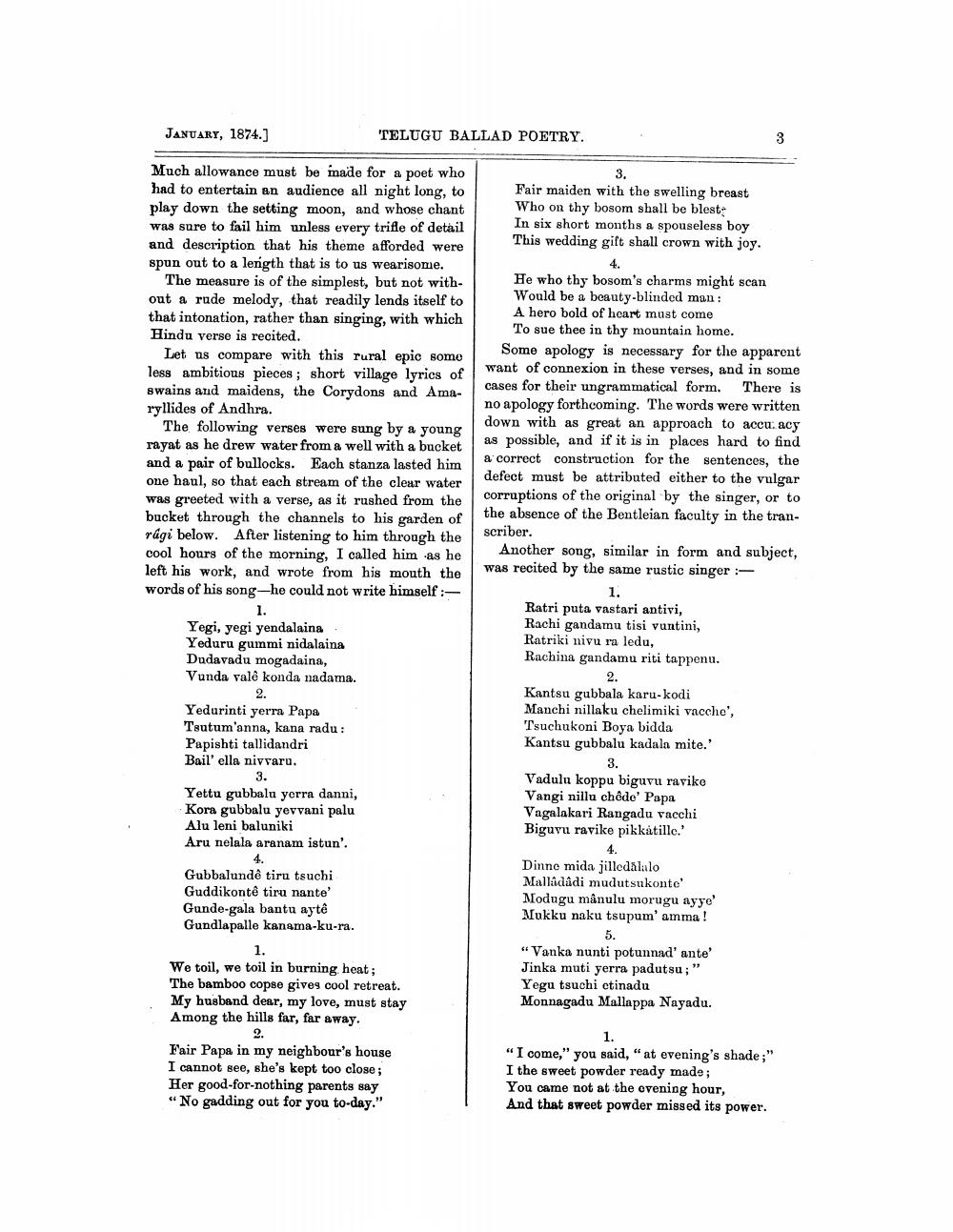Book Title: Indian Antiquary Vol 03 Author(s): Jas Burgess Publisher: Swati Publications View full book textPage 9
________________ JANUARY, 1874.] TELUGU BALLAD POETRY. CS Fair maiden with the swelling breast Who on thy bosom shall be bleste In six short months a spouseless boy This wedding gift shall crown with joy. 4 Much allowance must be made for a poet who had to entertain an audience all night long, to play down the setting moon, and whose chant was sure to fail him unless every trifle of detail and description that his theme afforded were spun out to a length that is to us wearisome. The measure is of the simplest, but not with. out a rude melody, that readily lends itself to that intonation, rather than singing, with which Hindu verse is recited. Let us compare with this rural epic some less ambitious pieces; short village lyrics of swains and maidens, the Corydons and Amaryllides of Andhra. The following verses were sung by a young rayat as he drew water from a well with a bucket and a pair of bullocks. Each stanza lasted him one haul, so that each stream of the clear water was greeted with a verse, as it rushed from the bucket through the channels to his garden of rügi below. After listening to him through the cool hours of the morning, I called him as he left his work, and wrote from his mouth the words of his song-he could not write himself : 1. Yegi, yegi yendalaina Yeduru gummi nidalaina Dudavadu mogadaina, Vunda valè konda nadama. 2. Yedurinti yerra Papa Tsutum'anna, kana radu: Papishti tallidandri Bail' ella nivvaru. 3. Yettu gubbalu yerra danni, Kora gubbalu yevvani palu Alu leni baluniki Aru nelala aranam istun'. He who thy bosom's charms might scan Would be a beauty-blinded man: A hero bold of heart must come To sue thee in thy mountain home. Some apology is necessary for the apparent want of connexion in these verses, and in some cases for their ungrammatical form. There is no apology forthcoming. The words were written down with as great an approach to accuracy as possible, and if it is in places hard to find a correct construction for the sentences, the defect must be attributed either to the vulgar corruptions of the original by the singer, or to the absence of the Bentleian faculty in the transcriber. Another song, similar in form and subject, was recited by the same rustic singer : 1. Ratri puta vastari antivi, Rachi gandamu tisi vuntini, Ratriki nivu ra ledu, Rachina gandamu riti tappenu. 2. Kantsu gubbala karu-kodi Manchi nillaku chelimiki vacche', Tsuchukoni Boya bidda Kantsu gubbalu kadala mite.' 3. Vadulu koppu biguvu ravike Vangi nillu chôdo' Papa Vagalakari Rangadu vacchi Biguvu ravike pikkatille.' Gubbalundê tiru tsuchi Guddikontê tiru nante' Gunde-gala bantu aytê Gundlapalle kanama-ku-ra. Dinne mida jilledálalo Malladadi mudutsukonte' Modugu mânulu morugu ayye' Nukku naku tsupum' amma! 5. “Vanka nunti potunnad' ante' Jinka muti yerra padutsu; " Yegu tsuchi etinadu Monnagadu Mallappa Nayadu. We toil, we toil in burning heat; The bamboo copse gives cool retreat. My husband dear, my love, must stay Among the hills far, far away. Fair Papa in my neighbour's house I cannot see, she's kept too close; Her good-for-nothing parents say “No gadding out for you to-day." 1. "I come," you said, " at evening's shade;" I the sweet powder ready made; You came not at the evening hour, And that sweet powder missed its power.Page Navigation
1 ... 7 8 9 10 11 12 13 14 15 16 17 18 19 20 21 22 23 24 25 26 27 28 29 30 31 32 33 34 35 36 37 38 39 40 41 42 43 44 45 46 47 48 49 50 51 52 53 54 55 56 57 58 59 60 61 62 63 64 65 66 67 68 69 70 71 72 73 74 75 76 77 78 79 80 81 82 83 84 85 86 87 88 89 90 91 92 ... 420
